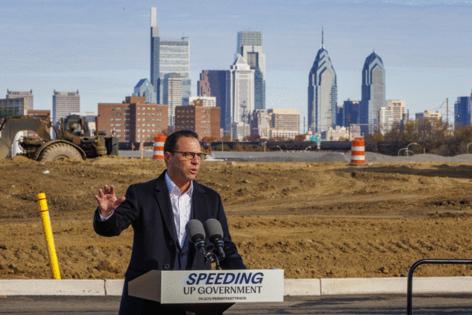Gov. Josh Shapiro said he's not sure SNAP will be able to exist in Pa. under President Trump's megabill
Published in News & Features
Gov. Josh Shapiro on Monday questioned the fate of federal food assistance in Pennsylvania if President Donald Trump's "big beautiful bill" tax and spending bill passes.
Previously, Shapiro had said that the state won't be able to backfill federal cuts to the Supplemental Nutrition Assistance Program, and on Monday he said the quiet part out loud.
"There's real question as to whether or not we'd even be able to operate SNAP any longer, given the change in the formula and given the people that are going to be knocked off," Shapiro told reporters after an unrelated news conference in Harrisburg.
The Democratic governor had not previously called the program's existence into question.
Nearly half a million Philadelphians rely on SNAP, also known as food stamps, to buy groceries — and the region is home to the most recipients in the state.
Some projections have found that the proposed plan would lead a to threefold spending increase for Pennsylvania amounting to hundreds of millions of dollars annually.
Shapiro said Monday that about 140,000 Pennsylvanians would lose access to SNAP under the federal proposal, a figure that comes from a Pennsylvania Department of Human Services' analysis. They would lose the benefit because the state can't afford to take on the costs, he said previously.
The proposal would increase the share of administrative costs for the state.
Pennsylvania paid $213,747,495 for administrative costs for SNAP for the 2023 fiscal year and the federal government covered all of the benefits. Under the federal proposal, the state would have paid nearly 52% more in administrative costs and more than $564 million in benefits that year.
The state's error rate, or how often it overpays or underpays SNAP benefits to households, could also impact funding under the federal proposal. Shapiro said on Monday that his administration has decreased the state's error rate and that he believes it will continue to go down.
The state's error rate was the 10th-highest in the country in 2023; the latest rate is expected to be released soon.
Shapiro also argued on Monday that the bill would have other negative impacts on Pennsylvanians because of its proposed cuts to Medicaid and to clean energy initiatives.
About 500,000 Pennsylvanians would lose access to healthcare, including 310,000 on Medicaid, and about 200,000 would lose access to Penny Health Care, Pennsylvania's state-based exchange created by the Affordable Care Act, he said.
Rural hospitals would be at risk, where more than 50% of their revenues come from Medicaid, hitting areas that supported Trump, he added.
Additionally, 26,000 people in Pennsylvania would likely lose their jobs in the energy sector, Shapiro said, and the bill would increase the federal deficit by $3.3 trillion, according to the Congressional Budget Office.
"It kind of doesn't make sense to me," Shapiro said. "You know, President Trump ran on a platform of cutting the deficit, said he'd never knock anybody off of Medicaid, and he wanted more energy jobs in the United States. He's doing the exact opposite, and screwing over, by the way, some of the very people that voted for him."
Shapiro said that it's illegal for undocumented immigrants to receive Medicaid in Pennsylvania and that it's a "phony excuse" when Republicans say the cuts will tackle "waste, fraud, and abuse."
"And let's be real, you know why they're doing it? Because they're trying to give a massive tax cut to people who don't need it, and by the way, a whole bunch of people who aren't even asking for it," he added.
©2025 The Philadelphia Inquirer, LLC. Visit at inquirer.com. Distributed by Tribune Content Agency, LLC.







Comments